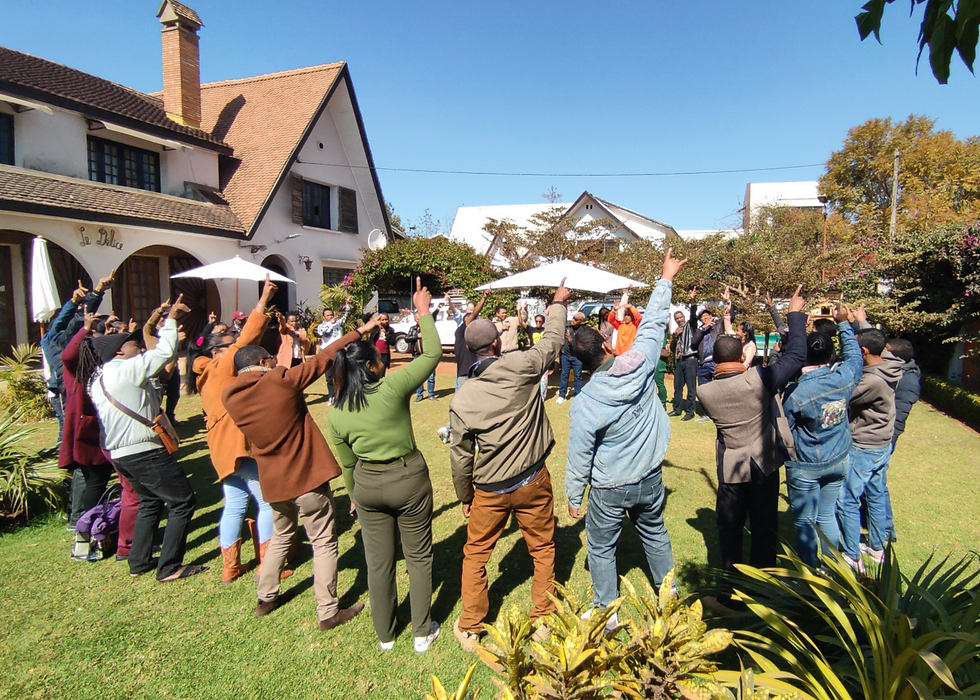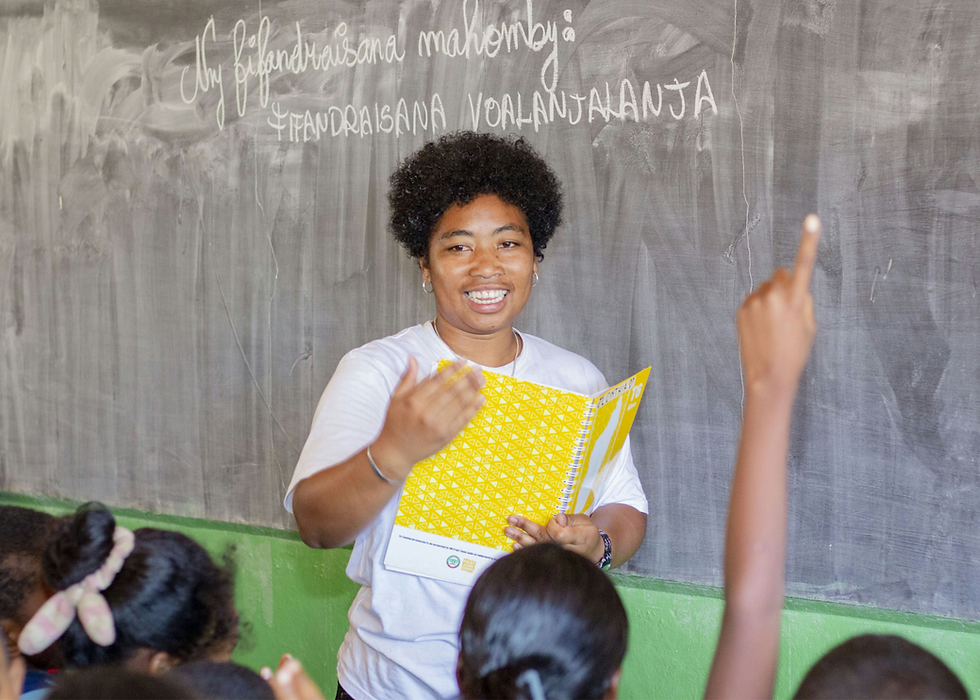Towards Empathetic and Inspiring School Leadership: Workshops with Partner Principals
- Projet Jeune Leader

- Aug 25, 2025
- 5 min read

PJL Educators don’t work alone. They are fully integrated into the public school system and the middle schools where they deliver our comprehensive sexuality education program. They work hand in hand with all the key players in their schools. Among them, principals play a central role. They set the values and overall direction of the school environment, which can either strengthen—or limit—the impact of PJL’s program. Since the very beginning, we’ve built strong relationships with them, grounded in trust and mutual accountability.
During our most recent symposium with principals from our partner public middle schools, a common theme emerged: many principals expressed a desire to continue learning and growing as leaders. So, we kicked off the school break with a series of leadership workshops centered around learning, and sharing, for 50 principals from schools working with PJL-hired Educators.
Workshops tailored to Principals’ learning goals
The workshops we organized this July came directly from principals’ requests and a survey circulated earlier in the year to identify their learning priorities .
Based on these findings, we focused the workshops for Principals on two key themes: social-emotional leadership and emotional intelligence. The goal was to strengthen principals’ leadership in their schools and help them build the skills to mobilize, listen, inspire, and manage relationships in an inclusive and nonviolent way.
For these workshops, we chose to separate groups by gender. Men and women covered the same themes, but separately. This decision came from our survey of principals, which highlighted clear differences in expectations and needs between genders. By creating separate groups, we were able to build a safer and more open space where participants felt comfortable speaking freely. It also allowed us to tailor the discussions and content more directly to their realities and professional challenges.
Each group was co-facilitated by an experienced external consultant and a member of the PJL team. Like all PJL workshops , these sessions used the core elements of participatory learning—experience sharing, group work, role plays, case studies, and interactive games.
“Im a leader in learning.” - Reflection from a Principal at the start of the training
A Fresh Take on School Leadership
Over the three days of workshops, principals had the chance to reflect on their professional practices, recognize their own limits, and identify ways to grow—both in their leadership style and in creating a school environment where young adolescents can truly thrive.
Participants came to realize that being an educational leader goes beyond teaching knowledge or managing staff. It also means modeling positive social behaviors, leading with care, and fostering a school climate built on cooperation.
“A significant shift took place: leadership was no longer seen as a position of authority, but as an inner attitude rooted in mutual respect, emotional stability, and adaptability. Expressions like “te hanandrana mitraka amin’ny fitoniana” reflect a deep desire to embody a calm, thoughtful, and authentic form of leadership.” - Excerpt from the report by Alison Rakotonirina, training consultant for the groups of women principals
Principals highlighted concrete progress in managing emotions, practicing self-control, using active listening, and communicating nonviolently. They also noted improvements in dealing with complex situations with greater emotional intelligence and empathy.
“Participants showed genuine commitment, reflected not only in the positive results of the pre- and post-training evaluations but also in the collective development of a roadmap to promote an inclusive and engaging school climate.” - Excerpt from the report by Toj’ Hery-Patrick Razafindradimy, training consultant for the groups of men principals
“Now, I want to grow into a leader who can serve as a role model in our school — someone who listens to others without judgment and who puts into practice nonviolent communication and the CTFAR method.” - Feedback from a Principal after the training
Many participants shared that the tools they received spoke directly to real challenges and that they were eager to apply them in their daily leadership and communication within their schools.
“During the sessions on emotional literacy, participants greatly valued the approach of viewing emotions as signals rather than weaknesses. Realizing that feelings like anger or frustration are normal—and can even provide useful insights—resonated deeply with them. This awareness helped redefine leadership as the ability to regulate oneself before leading others.” - Excerpt from the report by Alison Rakotonirina, training consultant for the groups of women principals
“My vision for my school after this training: A school that advances without being held back by obstacles. A peaceful place that fosters positive results. A school where love, solidarity, unity, and mutual respect thrive. A model school in every way.” - Feedback from a Principal after the training
Common challenges emerged during the discussions and role plays, such as communication with teachers and parents, conflict management, and even self-confidence. Participants expressed a strong interest in exploring these essential themes more deeply in future participatory workshops. Their motivation reflects a genuine desire to grow into transformative educational leaders, committed to supporting the well-being of their students.
Building on these constructive exchanges, we are exploring many ways to extend the momentum and insights from the workshops. These include designing a longer training program that covers more topics, offering more personalized coaching, and creating a peer learning community where principals can exchange ideas in a safe space, share best practices, and strengthen mutual support. To support this, our teams have set up a follow-up system designed to help identify challenges in the field, and provide the necessary support to ensure lasting impact.
"I had the chance to follow this training from start to finish. What I witnessed was inspiring: principals who were motivated, attentive, and genuinely eager to explore new tools. The discussions were open and rich, with everyone sharing experiences honestly and generously. For me, this training goes far beyond technical learning. It marks an essential step toward schools that are more inclusive, and more inspiring for everyone. Beyond the skills principals gained, it carries the promise of a lasting impact on the adolescents we support every day—and of a kind of leadership that can truly transform school life.” - Tahiry, PJL Research, Learning, and Accountability Coordinator

These sessions deepened our partnership with the principals, who remain our strongest allies and local champions in advancing PJL’s model.
A big thank-you to FANAINGA+ for their support in making these workshops possible!
A big shout-out to Alison Rakotonirina et Toj’ Hery-Patrick RAZAFINDRADIMY, our two fantastic training consultants — your energy and guidance made all the difference!
Alison Rakotonirina is a PCC-accredited coach (ICF) with certifications in Applied Positive Psychology and Positive Intelligence (PQ). She supports teams and leaders in developing social-emotional learning and purpose-driven leadership. As the founder and director of Sekoly Kintana Montessori in Fort Dauphin, Madagascar, Alison champions inclusive, culturally grounded education that highlights Madagascar and Africa. She is currently completing a Master’s in K–12 Education and works in both English and French, online and in person.
Toj' Hery-Patrick RAZAFINDRADIMY is a trained social worker, guided by a strong conviction: “inclusion changes lives—whether in the field of disability, gender, or youth.” With over a decade of experience in inclusive governance, protection, and humanitarian action, he has designed and led numerous trainings covering topics such as psychological first aid, psychosocial support, disability and inclusion, project management, and—more recently with PJL—socio-emotional leadership.A natural educator, he always grounds his interventions in the lived realities of participants, convinced that adult learning must begin with experience. He also believes deeply in the power of leadership to inspire change and has placed this vision at the heart of his humanitarian work and commitment to inclusive governance in Madagascar.











